Metascience at the NIH
The Senate Appropriations Committee just had its full markup of the appropriations bill as to NIH for the next year. They also released a 451-page report that includes a bunch of language that will be helpful towards improving science, including an admonition as to indirect costs.
Some highlights:
Article processing charges, or APCs.
As background, scientific journals that agree to make articles freely available often (or usually) require a payment upfront, and that’s usually paid out of the scientist’s grant. These charges can be quite expensive — for example, Nature (one of the top journals in the world) asks authors to pay $12,690 to make an article open-access.
Not surprisingly, there is a debate about the extent to which federal funders should pay for such charges. Free access: good. Thousands of dollars per article spent on over-priced journals: not so good.
The Senate Report addresses this issue by directing NIH to develop a rational limit on such charges:
Indirect Costs
This issue has obviously been top-of-mind for universities and scientists ever since a number of agencies issued plans to change the indirect rate to 15% overnight. A flat 15% seems like a bad idea for many reasons, including the fact that Congress banned any such idea several years ago (at least as to NIH), and moreover 15% is wildly out of line with what major pharmaceutical companies incur (more like 40-50%!). While indirect costs can certainly be reformed, such an immediate and drastic cut would destroy jobs across the country, including in states like Utah and Alabama.
I had been wondering whether Congress would push back on this issue, as they did in 2017. The Senate Republicans have now done so, in language saying that NIH is still forbidden from changing indirect costs.
Worth noting: The Senate is referring to the new Joint Associations Group on Indirect Costs, which has many members (AAU, AAMC, and many others) representing national universities and philanthropies. That group has come up with a new and innovative way of thinking about costs for federally-funded research (see here and here), which has been getting a lot of traction in DC. The new approach would be far simpler and more transparent, and it’s encouraging that the Senate is taking that into account.
Fund the Person, Not The Project
Back in 2024, congressional language required NIH to work on this issue:
Fund the Person, Not the Project.--While many labs are funded by R01-equivalent grants, the R35 mechanism arguably allows scientists more flexibility and freedom to pursue the best possible science. At present, only NIGMS uses the R35 to a significant extent (more than four times as often as the rest of NIH put together), with its Maximizing Investigators' Research Award [MIRA] program. The Committee directs NIH to convene an expert panel on expanding the R35/MIRA grant type such that is more widely used across NIH Institutes and Centers, and to report back to the Committee within 1 year on NIH's plans for expanding the R35 along with its plans for evaluating the impact on scientific progress.
This week’s Senate Report follows up on that requirement:
The Burden of Bureaucracy
The 2024 congressional language required NIH to take serious steps towards reducing administrative burden:
Reducing the Administrative Burden on Researchers.--The Committee recognizes that according to a national survey by the Federal Demonstration Partnership, federally-funded researchers report spending 44 percent of their research time on bureaucracy, including the time to prepare proposals and budgets, post-grant reporting of time and effort, ethical requirements, and other compliance activities. Although NIH and other agencies tasked with reducing administrative burden conducted extensive consultations with the research community that resulted in a 2019 final report on their implementation plans, the Committee is concerned about the status of the implementation by NIH and any plans to evaluate the outcome. The Committee directs NIH to form a Board on reducing administrative burden, with at least 75 percent representation from non-Federal organizations and at least 25 percent representation from early-career researchers (including post-docs). Within 1 year of enactment, the Board is directed to provide a report that includes an evaluation of current efforts to reduce administrative burden and to provide recommendations aiming to reduce the administrative burden on researchers by 25 percent over the next 3 years. The Committee strongly encourages NIH to put recommendations into effect as soon as practicable. The Committee requests a briefing on this effort 90 days from the enactment. The report recommendations shall be made available to the public on the agency website.
It’s not clear that NIH has done much, if anything, to comply with Congress’s directive. The Senate report thus repeats it:
Replication Experiments
The 2024 language mandated that NIH spend somewhere between $10 million and $50 million on replication experiments and fraud detection:
Funding Replication Experiments and/or Fraud Detection.--The Committee recognizes that many biomedical research studies have turned out to be irreproducible or even outright fraudulent. The recent Reproducibility Project in Cancer Biology showed that cancer biology studies in top journals often failed to be replicable, and a prominent line of Alzheimer's studies was recently found to be based on an allegedly fraudulent study funded by NIH in the early 2000s. Given the importance of detecting both reproducibility and fraud, the Committee provides $10,000,000 to establish a program to fund replication experiments on significant lines of research, as well as attempts to proactively look for signs of academic fraud. The Committee directs NIH to brief the Committee within 180 days of enactment on the establishment, staffing and plans for this effort in fiscal years 2024 and 2025. [On this one, the House suggested $50 million and the Senate suggested $10 million, but the two bodies couldn't agree on the dollar amount.]
The Senate is now following up on that item with the following:
Reorganization of NIH
The 2024 language required the NIH to restart the Scientific Management Review Board (SMRB), which was required in a 2006 law in order to give advice to Congress on the overall structure and performance of NIH (Francis Collins had let that board languish).
Scientific Management Review Board.--The Committee recognizes that under the NIH Reform Act of 2006 (Public Law 109-482), a Scientific Management Review Board [SMRB] was created with the specific mission of reviewing the overall ``research portfolio'' of NIH, and advising on the ``use of organizational authorities,'' such as abolishing Institutes or Centers, creating new ones, and reorganizing existing structures. Yet this Board has not met or issued a report since 2015, despite the obligation to do so every 7 years. The NIH Advisory Committee to the Director [ACD] does not have the statutory authority or mandate to serve as a substitute for the SMRB, and the Committee rejects any efforts to assign the ACD to undertake these efforts. The Committee directs NIH to reconvene the SMRB within 1 year of enactment in order to fulfill its statutory duty to advise Congress, the Secretary, and the NIH Director on how best to organize biomedical research funding.
The NIH did reconstitute the SMRB at long last, and the Senate is now following up by demanding more updates:
Pace of NIH Funding
The Senate is also concerned about multiple ways in which NIH funding might be slowing down in ways that could adversely affect science. First, there’s the issue of a slowdown per se. The Committee directed NIH to pick up the pace of awarding grants:
Second, there’s the recent issue of NIH putting out grant funding in its entirety in one fell swoop, which limits the money remaining for other grants this year. Here, the Committee doesn’t forbid NIH from doing so, but requires a report and analysis on how such a policy would affect existing and new grants.


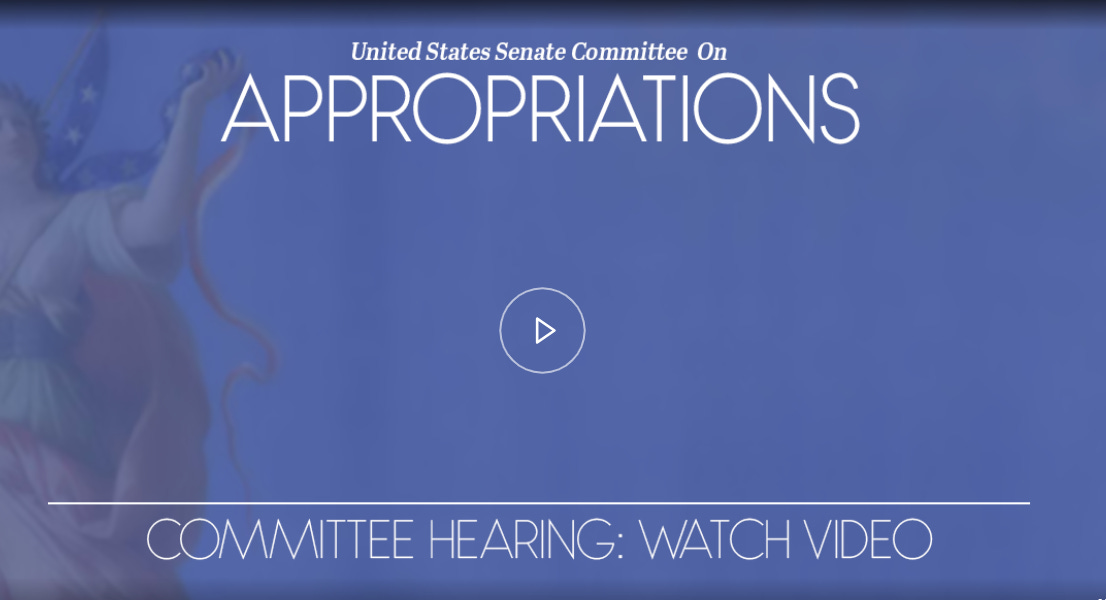
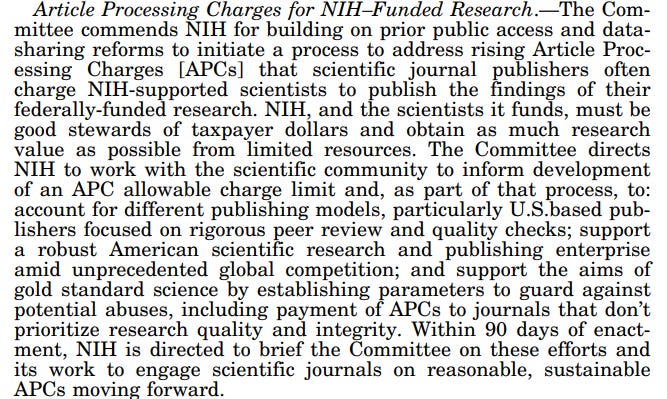
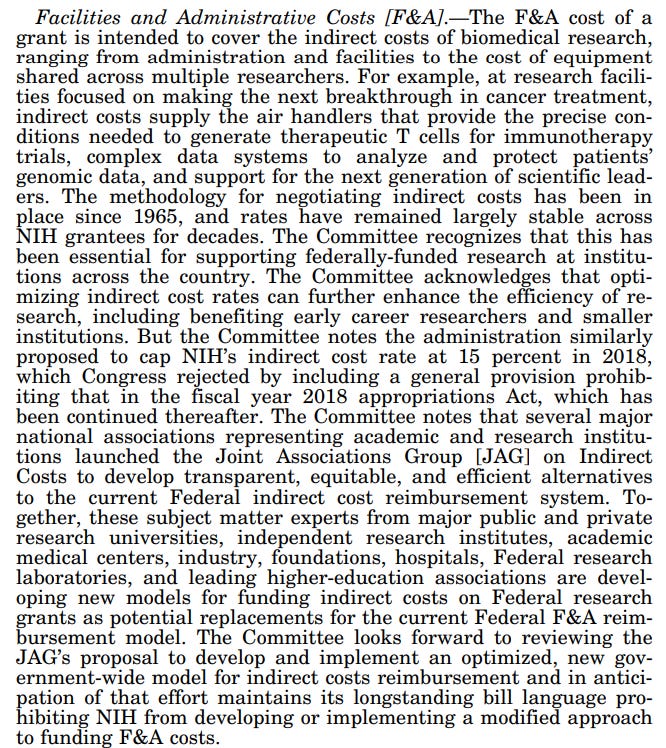






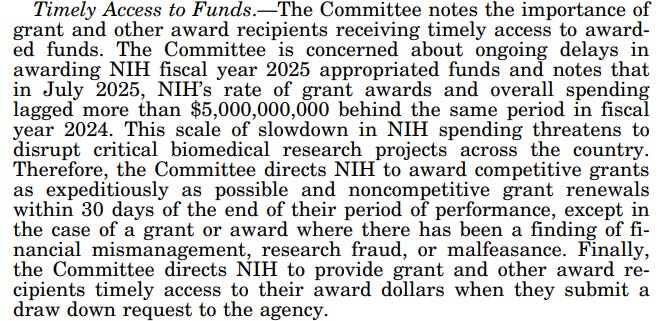
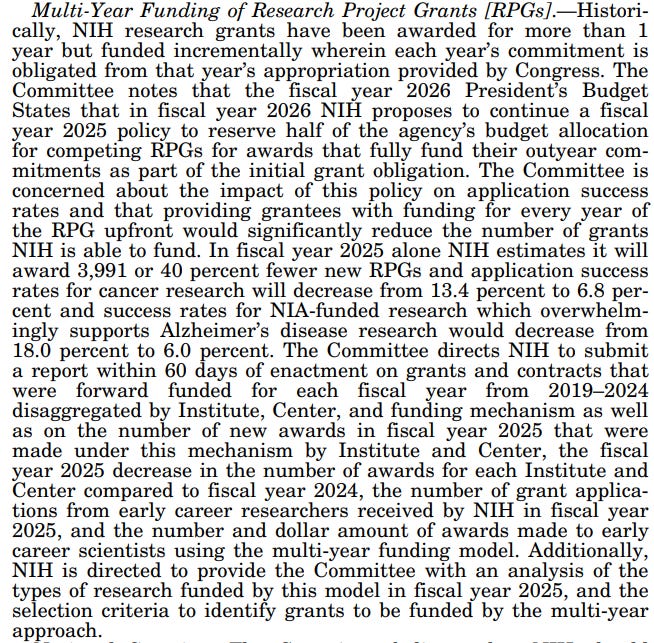
As someone who cares deeply about metascience but not deeply enough to actually, like, read a bill or anything, I just want to say how much I appreciate that you are able and willing to dive into the weeds on this sort of thing and bring back comprehensible summaries for the rest of us.
On the substance--I am far from being a 'burn it all down' kind of guy, but gosh it seems hard to reform an agency when the main mechanism of reform is, once every decade or so, Congress telling them to form a committee to think about maybe making some changes.
My department chair just shared this article with our faculty and I really appreciate the useful information on where NIH policies may be headed in all of these areas, as I have several R01 applications in play now and am trying to build a network for science and education advocacy here on Substack. I look forward to checking out your other work and will try to highlight posts of general interest to my readers in my next essays on Substack (Democracy, Social Justice, Education, and the Common Good).